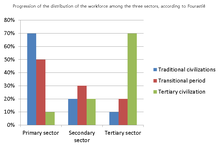One classical breakdown of economic activity distinguishes three sectors:[1]



In the 20th century, economists began to suggest that traditional tertiary services could be further distinguished from "quaternary" and quinary service sectors. Economic activity in the hypothetical quaternary sector comprises information- and knowledge-based services, while quinary services include industries related to human services and hospitality.[2]
Economic theories divide economic sectors further into economic industries.
An economy may include several sectors that evolved in successive phases:
Even in modern times, developing countries tend to rely more on the first two sectors, in contrast to developed countries.
An economy can also be divided along different lines:
Regarding the terminology itself Clark informs that "the term tertiary industries was originated by Professor A. G. B. Fisher in New Zealand, and became widely known through the publication of his book, The Clash of Progress and Security, in 1935. It took its origin from the titles current in Australia and New Zealand of 'primary industry' for agriculture, grazing, trapping, forestry, fishing and mining, and 'secondary industry' for manufacture. In Australia and New Zealand these terms are not only used in statistical reference books but are widely current in popular discussion. The phrase 'tertiary industries' therefore immediately carries, in these countries, a suggestion of those excluded by the official definition of 'secondary industries."